|
Story originally published by DeSmog UK
The Supreme Court of Ireland has ruled in favour of an environmental group challenging the Irish government’s climate plans, finding its policies did not meet legal requirements for detailing how the country will meet emissions-reduction targets. The decision is only the second time a country’s highest court has required a national government to reform its climate policy in order to meet legal obligations. Environmental group Friends of the Irish Environment (FIE) filed the case in 2017 against the government claiming that a climate policy adopted that year was unlawful under various legal authorities including Ireland’s Climate Act of 2015, the country’s Constitution, and the European Convention on Human Rights. FIE argued the 2017 Climate Mitigation Plan, which followed from the statutory Climate Act and set out pathways for a low-carbon transition, lacked requirements to cut emissions in the near term. The group noted that Ireland’s emissions had increased in recent years and that the country is not on track to meeting its emission reduction goals. The High Court initially dismissed the case on the grounds that the government has wide discretion to set policy. The Supreme Court, which took the case in a “leapfrog” appeal given the urgency of climate policy, reversed that decision with a ruling on July 31 that found the 2017 Climate Mitigation Plan did not meet statutory requirements of Ireland’s 2015 climate law. The Chief Justice concluded that the plan “falls well short of the level of specificity required to provide that transparency and to comply with the provisions of the 2015 Act.” The ruling, delivered just over a month after hearings were held before the Court, proposes the plan be quashed. According to FIE, the Irish government “must now create a new, more ambitious National Mitigation Plan that complies with Ireland’s national and international climate obligations.” Dr. David R. Boyd, UN Special Rapporteur on human rights and the environment, said in a press release that “this landmark decision recognizes the urgency of responding to the climate emergency and sets a precedent for courts around the world to follow.” The case is part of a wave of climate lawsuits around the world seeking to hold governments accountable for inadequate climate action. Many of the cases make claims of constitutional and human rights violations. The Irish case included rights-based claims, though the Supreme Court judgment was not based on those claims. The judgment did note that FIE as a “corporate entity” would not have “standing” or permission to bring a case claiming violation of rights that are only guaranteed to individuals. The Chief Justice also expressed his skepticism toward an unenumerated or inherent right to a healthy environment under the Irish Constitution. The ruling is clear, however, that Ireland has a legal obligation to make detailed and specific requirements in its climate policy for slashing emissions in the short term and beyond. “The Irish Government can no longer make promises it will not fulfill. It has a legal obligation to protect citizens from the worst impacts of climate change by reducing Ireland’s emissions in the short-term. Failure to do so is a breach of its legal obligations on climate change,” Beth Doherty of youth campaign group Fridays for Future Ireland said in a press release. Clodagh Daly, spokesperson for Climate Case Ireland, said the pressure must be kept on the government to ensure that it follows through with a more aggressive climate policy. “Exciting as a legal win may be, the real work now lies in the creation of a transformed National Mitigation Plan – one that guarantees the rapid and dramatic reduction of Ireland’s emissions,” Daly said. “It is technologically and economically feasible for us to achieve this – and the Supreme Court has now affirmed that there is no legal basis for a lack of political will. The government needs to step up.” The Irish climate lawsuit was inspired by a case brought by the Netherlands-based Urgenda Foundation, whose CEO Marjan Minnesma said in a press release: “the Irish Supreme Court has taken a historic step today that will give hope to people all over the world.” Urgenda successfully challenged the Dutch government's 2020 emissions reduction target, winning an initial verdict in 2015 before the Dutch Supreme Court issued a final ruling last December, which ordered the government to make steeper emissions cuts in order to safeguard human rights threatened by the climate crisis.
1 Comment
ExxonMobil is leading the charge for Big Oil entities in moving two new climate-related lawsuits filed against the entities in June from state court to federal court, arguing the cases brought by the attorneys general of Washington DC and Minnesota are “political acts” seeking to dictate climate policy. Attorneys General Keith Ellison of Minnesota and Karl Racine of the District of Columbia filed their cases on June 24 and June 25, respectively, in state and local courts alleging Big Oil violated state and local consumer protection statutes by misleading consumers about the climate consequences of their fossil fuel products. Defendants in the Minnesota case include ExxonMobil, Koch Industries and two Koch subsidiaries, and the main U.S. oil and gas trade association, the American Petroleum Institute. Defendants in the DC case include ExxonMobil, Chevron, BP, and Shell. In an expected procedural move, lawyers for Exxon filed notices of removal to shift the two cases to federal courts, a tactic that fossil fuel companies have used in all climate-related lawsuits filed against them because they have seen some success in getting several climate cases dismissed in federal courts. The U.S. Supreme Court in 2011 nixed a case (AEP v. Connecticut) brought by a group of states against power plants, and more recently two federal district judges in California and New York dismissed cases brought by Oakland and San Francisco and by New York City against Big Oil seeking compensation for climate damages. The cities have since appealed, and the San Francisco and Oakland case is now a step away from moving ahead in state court. Exxon filed a notice of removal on July 17 to transfer the DC case from the DC Superior Court (the equivalent of a state court) to the federal U.S. District Court for the District of Columbia. Ten days later on July 27 Exxon did the same for the Minnesota case, moving it from the Ramsey County District Court (a Minnesota state court) to the federal U.S. District Court for the District of Minnesota.
In both notice of removal filings, Exxon characterizes the lawsuits as a “product of special interest groups and plaintiffs lawyers’” looking to bring down the fossil fuel industry and overtake the federal government’s role in addressing climate change. The Attorney General is “not entitled to use state power to suppress speech and deter free association as part of a coordinated campaign to change federal climate and energy policy,” Exxon lawyers write in the notice of removal for the Minnesota case. According to Exxon, the complaint in both cases “intrudes on the federal political branches’ exclusive authority to address important issues of national and international policy.” “The Complaint is a political act, not a legal one,” Exxon’s lawyers write in both notices of removal. Exxon offers multiple grounds for removing the cases to federal courts. Exxon says the cases raise “substantial federal questions,” that they “necessarily arise under federal common law” and arise out of federal enclaves, that they implicate federal statutes like the Outer Continental Shelf Lands Act and the Federal Officer Removal Statute, and alternatively that the cases are really class actions brought on behalf of DC and Minnesota citizens and are removable to federal court on those bases. Exxon has also filed a notice of removal to federal court in a similar case claiming violation of the DC Consumer Protection statute brought by an environmental group called Beyond Pesticides. Exxon is the sole defendant in that case, filed in May, and Exxon sent the notice of removal on July 6. Despite attempts by Exxon and fellow oil companies to remove these cases to federal courts, a handful of federal judges have now rejected these moves and sent (remanded) climate liability cases back to state courts. Most of these cases are brought by cities and counties under legal claims such as nuisance and trespass and some of the cases also include product liability claims; plaintiffs bring these claims under state common law, seeking monetary damages to help pay for costs of building sea walls and adapting to unavoidable climate impacts. But the Minnesota and DC cases, as well as a case brought last fall by the Massachusetts attorney general, are straightforward consumer fraud cases brought under (state) consumer protection laws, meaning it is even more unlikely federal courts will accept these types of cases. A federal district judge in Massachusetts already rejected Exxon’s bid to move the Mass. AG case to federal court. That judge described Exxon’s arguments as a “caricature of the complaint” and said the case raises no federal issues. Massachusetts Attorney General Maura Healey sued Exxon on October 24, 2019 alleging violation of the Massachusetts Consumer Protection Act for allegedly deceiving investors and consumers about the risks of climate change. As District Judge William G. Young explained in a May 28, 2020 order sending the Mass. case back to state court, the core issue in these consumer fraud cases is not climate change itself, but Exxon’s communications (such as advertising) about its products and their role in causing climate change. “The Court concludes that the ‘problem’ at issue in this complaint is not geophysical but economic -- namely, has ExxonMobil been sufficiently candid with its investors and customers in Massachusetts about the simmering calamity of global warming?” Young wrote. A 23-year-old law student in Melbourne, Australia has brought what is described as a “world-first” climate lawsuit against the Australian government for failing to disclose climate-related risks to holders of government bonds. The climate crisis poses a material financial risk to investors in Australian sovereign bonds, the lawsuit contends, and the government has a legal duty to disclose these risks.
Katta O’Donnell is the plaintiff in the lawsuit filed July 22 in the Federal Court of Australia. O’Donnell is a law student at La Trobe University and herself a holder of government bonds. According to the Guardian, O’Donnell “said young Australians owned bonds through their superannuation funds but were in the dark about government assessments of the climate risk their investment faced.” She brought the lawsuit as a class action representing other holders of government bonds, which are a type of investment of loaning money to the government. David Barnden of Equity Generation Lawyers, attorney Thomas Wood and former federal court judge Ron Merkel are the lawyers representing O’Donnell. According to the Equity Generation Lawyers website, this case (O’Donnell v. The Commonwealth) is the “first case in the world dealing with climate as a material risk to the sovereign bond market.” The complaint says that Australia “breached its duty” by “failing to disclose any information about Australia’s Climate Change Risks.” These risks include the physical impacts of climate change like extreme weather events, financial impacts resulting from the transition away from fossil fuels, and other related economic risks in the context of a delayed response to the climate crisis. The lawsuit seeks a court order declaring the government breached its legal duty to disclose material risks and preventing the government from further promoting sovereign bonds until it complies with its duty to disclose climate-related risks. This is the first climate lawsuit in the world taking a national government to court over financial risks investors face as governments continue to prop up the fossil fuel sector that is driving the climate crisis. As Equity Generation Lawyers explains, “Australia’s lack of credible [climate] policies is expected to ultimately cost the economy when a sudden and disorderly transition [away from fossil fuels] occurs.” Institutional investors and financial entities are increasingly recognizing that the climate crisis poses a systemic economic risk in Australia and around the world. The Reserve Bank of Australia, the country’s independent central bank, warned of systemic climate risks to Australia’s economy and other central banks have made similar warnings. In the U.S. a group of large investors holding almost $1 trillion in assets sent a letter to the Federal Reserve on July 21 arguing that climate change is a systemic risk to the economy and urging the adoption of climate-related risk disclosures. As O’Donnell said, as reported by the Guardian, it is clear that climate change is a present danger and will only get more severe. “It’s time the government told the public about the impact climate change will have on our future and the economy,” she said. A nonprofit climate litigation organization in the UK is challenging the British government’s COVID economic recovery plan on climate change grounds, taking the first step in the legal process by sending a formal notice to the government on July 21.
The organization Plan B sent the notice, called a Pre-Action Protocol letter, to several UK government officials including Prime Minister Boris Johnson as well as Governor of the Bank of England Andrew Bailey and Chair of UK Export Finance Noël Harwerth. The Pre-Action Protocol follows an informal letter that Plan B sent on July 7, and requests the government officials explain how the UK economic recovery program complies with the government’s legal obligations to act on the climate crisis. Plan B says it intends to file a lawsuit in the Administrative Court if the government does not provide an “adequate response” by August 4, 2020. According to Plan B’s July 21 letter, this expected litigation seeks a court order declaring that the UK government’s recovery program “must be consistent with the Government’s obligations under Climate Change Act 2008, the Paris Agreement and the Human Rights Act 1998.” Plan B raises concerns that the current recovery plans include investment and lending to fossil fuel projects and other actions to further stimulate the carbon-based economy. The government “has now committed £1billion to financing a new natural gas project in Mozambique,” Plan B cites as an example. Plan B also notes that the Bank of England’s lending as part of the Covid-19 emergency response “has not incorporated a test based on climate considerations.” The Bank’s lending in this regard appears contradictory to statements co-authored by Bank Governor Andrew Bailey on June 5: “To address climate breakdown, we can instead take decisions now that reduce emissions in a less disruptive manner…This will only happen if financial decisions, including those made by businesses, investors, banks and governments, take the climate crisis into account.” One question Plan B asks in its Pre-Action Protocol letter is if the Prime Minister or the Chancellor influenced the Bank’s more recent position to not include a climate test in its economic recovery lending decisions. According to Plan B, the UK government “is disregarding both the expert advice and the law” and is “instead using the Recovery Programme to double-down on the carbon economy, unlawfully locking us into a trajectory towards disaster.” In June this year the government’s Committee on Climate Change warned that the UK is not on track to meet its climate commitments and said the government should consider preparing for warming of 4°C, which is more than double the limit that nearly all countries in the world agreed to in adopting the Paris Climate Agreement. Plan B previously won a court ruling against the UK government’s plans to expand Heathrow Airport, with the ruling based on the government’s failure to take proper account of the Paris Agreement. In terms of the COVID economic recovery, Plan B Director Tim Crosland said the UK has a clear choice. “The Government can either follow the scientific and economic advice and take a decisive step towards a cleaner, fairer and more sustainable economy, creating a vast number of new jobs; or it can ignore that advice by prioritising its corporate sponsors and locking us into the path to climate breakdown and a future that is grim beyond words,” Crosland said. The Canadian federal government is asking a court to dismiss a constitutional climate lawsuit brought by 15 young people alleging the government is failing to protect their fundamental rights through actions and inaction that worsen the climate crisis. Such a lawsuit is about questions of policy that cannot be handled by courts, the government argues.
“Canada moves to strike the Statement of Claim (“Claim”) not because it disagrees with the importance of addressing global climate change, but because the legal claims advanced by the Plaintiffs are not justiciable,” the Attorney General of Canada wrote in a motion to strike (dismiss) filed July 10 in the case La Rose et. al. v. Her Majesty the Queen. “The Claim does not target any particular law or its application. Instead, it asks the Court to decide whether the executive is governing well,” the Attorney General argued in the motion, adding that the issues raised are “legislative and political in nature.” The La Rose lawsuit, filed in October 2019 against the federal government of Canada, is modeled after the American constitutional youth climate lawsuit Juliana v. U.S. As in Juliana, the Canadian youth plaintiffs claim the federal government is violating their constitutional rights as well as violating the public trust doctrine through actions that exacerbate the climate crisis. Specifically the Canadian plaintiffs say the government is failing to protect their rights under sections 7 and 15 of the Canadian Charter of Rights and Freedoms, sections that outline rights to life, liberty, and security of the person as well as substantive equality under the law, respectively. The youth plaintiffs seek a court order declaring the government is harming young people in its inadequate response to climate change and requiring the government to develop a science-based climate recovery plan. Plaintiffs are Canadians ages 10 to 19 representing seven provinces and one territory and all have personally suffered harms from the climate crisis, which disproportionately impacts young people and future generations. The Canadian government acknowledges this disproportionate impact on younger generations but argues this is not a basis for legal action. Climate change is a global issue requiring international action, the government says, arguing the remedy plaintiffs seek will not solve the problem. The government offers multiple other reasons why the case should be dismissed, such as claiming that the lawsuit is too broad in scope and does not challenge a specific policy or law, that the claims under sections 7 and 15 of the Charter are not valid, and that Canadian law does not recognize the public trust doctrine. The government further notes that similar climate lawsuits brought against national governments have mostly been unsuccessful, including the Juliana case that was dismissed earlier this year. “Nonetheless, several cases of this nature brought in jurisdictions elsewhere in Canada or in similar jurisdictions have not succeeded in demonstrating that the courts are an appropriate venue for seeking changes to climate policy,” the Attorney General wrote in the motion to strike. The Canadian government will present these arguments during a two-day hearing on the motion to strike scheduled for September 30 and October 1, 2020 in Vancouver. Lawyers for the youth plaintiffs will file a written response by August 31 and will present their arguments at the hearing as well. Several of the youth plaintiffs said they were “disappointed” by the government’s move to try to dismiss their lawsuit. “I am counting on my government to protect my rights as a young Canadian, and I am extremely disappointed that the federal government wishes to dismiss our claim and deny us our day in court,” Lauren Wright, 15-year-old plaintiff from Saskatoon, Saskatchewan, said in a press release. “The COVID-19 pandemic has demonstrated that rapid change to address an emergency is entirely possible. Our government needs to apply this same urgency to the climate crisis, which is causing health problems for millions of Canadians like me.” “It is already a shame we have to seek protection from the courts so that they order our government to secure us a future,” added Albert Lalonde, 18-year-old plaintiff from Montreal, Quebec. “I am now even more disappointed that our government doesn’t at least have the courage to go to trial. I am confident that the Constitution will be upheld.” Oil and gas companies – defendants in a climate liability lawsuit brought by Baltimore – filed a response brief on July 15 in their petition before the U.S. Supreme Court arguing that the Court should resolve a question on the scope of appellate review of remand orders. According to the companies, there is a significant split among the federal appeals courts on this question, and the Supreme Court’s “review is urgently needed.”
Baltimore filed the suit to hold these companies – major producers of fossil fuels – liable for monetary damages to help pay for the localized impacts of climate change, impacts the city says are worsened by the companies’ alleged campaign of deception and denial to undermine the science and avoid climate action. The companies are waging a procedural battle to remove this case and similar climate lawsuits to federal courts, where they believe they have an easier path to dismissal. But four federal district judges and three federal appeals courts have now ruled that the cases should be remanded, or sent back, to state courts where they were originally filed. The companies are challenging these rulings. In Baltimore’s case, the defendants filed a petition to the Supreme Court on March 31 seeking review of the Fourth Circuit Court of Appeal’s March 6 ruling upholding the federal district court’s remand order. Baltimore’s case is proceeding in state court even as defendants argue it should be in federal court. Attorneys for Baltimore filed a response to the Supreme Court petition on June 29, arguing that the Fourth Circuit decision was correct and there is no significant split among federal appeals courts regarding the scope of review of remand orders. The oil company defendants countered with a response filed July 15 saying there is indeed a significant split. They argue that a statutory provision (28 U.S.C. 1447d) providing an exception for appellate review of remand orders on two distinct grounds means that the entire remand order is reviewable, not just the two distinct grounds for removal. The distinct grounds for removal that is relevant in this case is the “federal officer” claim, where defendants argue they were “acting under” the authority of federal officials in their operations. Baltimore argued, and the Fourth Circuit agreed, that the appellate review is limited to only the federal officer issue. The defendants, however, claim the scope of review should be much broader. Northwestern School of Law Professor James E. Pfander, an expert in federal jurisdiction and civil procedure, said the statute is clear that federal appellate review of remand orders is limited. “The statute in 1447 does foreclose review of those [additional] issues [for removal] and accepting review of them will complicate and delay the appeal, precisely the result Congress wished to avoid with the statute,” he told Climate in the Courts via email. He also said the federal officer issue has been too widely used by private parties seeking appellate review of remand orders. “What I find really interesting is that the defendants focus entirely on the scope of appellate review question, rather than asking for a clarification of the meaning of the federal officer removal provision,” Pfander said. “That provision has, in my judgment, been too expansively interpreted, allowing a good deal of private litigation to flow into federal court on the theory that private parties were acting as the agents of the federal government.” In this climate liability litigation, three federal appeals courts have rejected the oil companies’ claims that they were acting as federal officers. The Supreme Court grants only a very small number of petitions it receives. The Court will decide on September 29, 2020 if it will consider the oil companies’ petition in Baltimore’s case. Should the Court decline the petition, the companies will have little choice but to face litigation in Maryland state court, where they could eventually face discovery and a trial – stages they appear desperate to avoid. As the companies conclude in their Supreme Court petition, “this Court’s review is urgently needed.” Australia is violating human rights in its continued support of fossil fuels and contributions to the climate crisis, environmental lawyers in Australia and the U.S. explain in a recent submission to the United Nations Human Rights Council. These lawyers are urging the Council to make recommendations that Australia take actions to reduce its greenhouse gas emissions to “reflect the highest possible ambition” and to phase out fossil fuels.
Environmental Justice Australia, Environmental Defenders Office, and the U.S.-based group Earthjustice – nongovernmental organizations working on environmental law issues – submitted a document on July 8 to the UN Human Rights Council outlining how Australia is failing to uphold its legal obligations to protect human rights with respect to the climate crisis. The submission is part of a UN process called a Universal Periodic Review (UPR), whereby the Human Rights Council reviews UN member states’ human rights records approximately every five years. The Council issues a report to each country under review and countries can either accept or take notice of the report’s recommendations. Australia is scheduled for review in early 2021. The UPR process does not carry the same force as a lawsuit and Australia could decide not to accept the recommendations, although it would have to explain such a decision in writing. “Recommendations made to Australia as part of the Universal Periodic Review (UPR) process are not enforceable,” Noni Austin, an Australian and US lawyer in Earthjustice’s International Program, explained via email. “However, the UPR focuses international attention and pressure on Australia’s climate inaction, and we know that the Australian government is particularly sensitive to such attention.” “In addition, recommendations made during the UPR provide opportunities for civil society to hold the Australian government accountable by highlighting its refusal to protect fundamental human rights,” Austin added. “For example, during the UPR process itself, Australia has to note whether it accepts or does not accept each recommendation.” As the environmental law organizations note in their recent UPR submission, Australia’s actions are fueling the climate crisis and putting human rights at risk. Australia’s GHG emissions (excluding emissions from land use, land-use change and forestry) rose every year from 2014 to 2018, and the country is not on track to meets its 2020 or 2030 emissions reduction targets. Australia continues to subsidize and promote fossil fuels. It is one of the largest exporters of coal and liquefied natural gas in the world. “Australia is failing to fulfill its human rights obligations to prevent foreseeable harm to human rights caused by climate change,” the environmental law organizations’ submission concludes. “Instead, its actions are worsening climate change and, accordingly, intensifying current and future harm to human rights in Australia and around the world.” Human rights such as the rights to life, health, housing, food and self-determination are increasingly threatened due to impacts stemming from the climate crisis, which is largely caused by burning fossil fuels. In Australia for example, the devastating bushfires in 2019 and early 2020 killed at least 34 people and destroyed thousands of homes, and scientists say climate change increased the likelihood the fires would be this destructive by 30 percent. Indigenous Australians such as the Torres Strait Islanders are particularly vulnerable to climate impacts and corresponding human rights violations. In May 2019 the Torres Strait Islanders sent a first-of-its-kind human rights complaint against the Australian government relating to climate change to the UN Human Rights Committee (a separate authority from the UN Human Rights Council). The Australian government has since said it would commit $25 million towards climate adaptation for the Torres Strait area – islands off the northern tip of Queensland that are at risk of disappearing under rising seas. The Australian government has not, however, addressed the Torres Strait Islanders’ other demands for increased reduction in GHG emissions and phasing out coal. “Australia is among the world’s largest exporters of coal and liquefied natural gas and plans to continue expanding these exports. Australia’s fossil fuels will contribute emissions around the world for decades to come, contrary to clear evidence that fossil fuels must now remain unburned to avert the most serious consequences of climate change,” Ariane Wilkinson, senior lawyer at Environmental Justice Australia, said in a press release. “We are asking the UN Human Rights Council to urge Australia to uphold its human rights obligations under international law,” added Earthjustice’s Noni Austin. “All Australians’ human rights should be protected and this requires Australia to take strong climate action now and encourage other countries to do the same.” Fossil fuel companies defending against climate liability lawsuits filed by California communities are asking the Ninth Circuit Court of Appeals to reconsider recent rulings favoring the California plaintiffs looking to advance their cases in state courts.
The companies want these cases in federal courts where they see an easier path to dismissal, as federal judges have tossed several climate change lawsuits including suits brought by the cities of Oakland and San Francisco. The Ninth Circuit Court of Appeals, however, revived the Oakland and San Francisco cases in a ruling on May 26, 2020 finding that there were no federal issues raised. The appeals court issued a separate decision that day in climate lawsuits brought by San Mateo County and several other California communities, finding that those cases should proceed in California state courts, as federal District Judge Vince Chhabria previously ruled. Both of these May 26 decisions were issued by a three-judge panel from the Ninth Circuit Court. The fossil fuel companies filed two petitions on July 9 requesting re-hearings, essentially asking for a do-over in a desperate bid to stop the cases from moving forward in state courts, where they would be on track towards discovery and trial. The lawsuits allege the companies knew for over half a century about the dangers of burning fossil fuels and that they actively worked to undermine climate science and deceive the public to protect their profits. California communities are demanding monetary damages to help pay for costs relating to climate change impacts like sea level rise and coastal flooding, costs estimated in the billions of dollars. Similar lawsuits have been filed by the state of Rhode Island, a commercial fishing association, and local governments across the country. Despite attempts by the fossil fuel companies to remove the cases to federal courts, several federal district courts and now three federal appeals courts have decided that state courts are the proper forums. The companies, however, continue to insist the cases must be heard in federal courts even as the cases are starting to proceed in state courts anyway. In a lawsuit brought by Baltimore, for example, the case is currently working its way through Maryland state court while the fossil fuel companies have a petition pending before the U.S. Supreme Court. Colorado Governor Jared Polis and a state environmental agency are facing a new lawsuit filed by an environmental advocacy group arguing the government failed to meet a legally required deadline to issue rules for reducing the state’s greenhouse gas emissions as mandated by statute.
The lawsuit, filed July 9 in Denver County District Court by the group WildEarth Guardians, seeks to compel Colorado regulators into action on meeting the state’s climate targets. Those emissions reduction targets are outlined in a bill signed into law last year, including a 26 percent cut in emissions by 2025, 50 percent cut by 2030, and 90 percent reduction by 2050. A related bill also signed into law last year includes a deadline of July 1, 2020 for the state to publish a notice of proposed rulemaking for measures that would allow the state to meet its targets. WildEarth Guardians says the state has not met this deadline and claims this failure is “arbitrary and capricious” and unlawful under the statute. “The rapidly worsening climate crisis and Defendants’ inaction to address Colorado’s contribution to the crisis will harm Guardians’ interests in clean air, clean water, wildlife, intact ecosystems, and a livable planet,” the complaint argues. Defendants include Governor Polis (a Democrat), the Colorado Department of Public Health and the Environment, and two subdivisions of that agency – the Air Quality Control Commission and the Air Pollution Control Division. The complaint notes that the state has taken a few steps towards reducing emissions, including finalizing rules on zero emission vehicles and regulating hydrofluorocarbons as well as revising oil and gas control measures. But these initiatives fall short of actions needed to meet the 2030 target of reducing greenhouse gas emissions by 50 percent, the complaint argues. WildEarth Guardians says it obtained an email sent to a Colorado citizen by the Air Pollution Control Division acknowledging that those measures “are not sufficient in and of themselves to reach the greenhouse gas emissions reduction milestones set forth [in statute].” WildEarth Guardians further argues that failure to meet the July 1 deadline and allegedly delaying climate action will be most harmful to disadvantaged communities in the state like low-income families and communities of color. “The failure of the Polis administration to live up to legally binding climate obligations means the state is not achieving environmental justice,” WildEarth Guardians’ Jeremy Nichols said in a press release. “When it comes to confronting the climate crisis, time is of the essence,” Nichols added. “We can’t afford any missed deadlines or footdragging. It’s time for Governor Polis to step up, be a leader, and put the state on course for urgent action that sets a model for other states and nations and puts Colorado at the forefront of advancing solutions that truly confront the climate crisis.” Colorado communities suing oil companies ExxonMobil and Suncor Energy over local climate impacts and associated costs can advance their case in Colorado state court, a federal appeals court has ruled. It is the latest setback for fossil fuel companies fighting similar climate liability lawsuits across the country.
The Tenth Circuit Court of Appeals ruled on Tuesday, July 7 to uphold a lower court order remanding or sending back to state court a lawsuit originally filed in April 2018 in Boulder County District Court, a Colorado state court. The city and county of Boulder and the county of San Miguel brought the lawsuit against ExxonMobil and Suncor alleging the unchecked sale and promotion of petroleum products in the state, despite the climate-related risks known to the industry, are exacerbating costly impacts like extreme heat, drought, wildfires and floods. The lawsuit seeks monetary damages and includes legal claims of nuisance, trespass, and violation of the Colorado Consumer Protection Act. Like similar climate liability lawsuits filed by communities against major fossil fuel producers, the Colorado case was embroiled in a jurisdictional battle over whether the suits belong in state or federal court. The industry defendants want the cases in federal courts, where they have had success in getting several climate nuisance lawsuits dismissed. But the communities bringing the cases argue they are pleading strictly state law claims that are best handled by state courts. Four federal district judges, including in Colorado, have agreed with the communities that the cases belong in state courts. The defendants have appealed these decisions. Two federal appeals courts, the Fourth and Ninth Circuit Courts, have already rejected the appeals. Now the Tenth Circuit has followed their lead. These appeals court rulings focus on a narrow statutory provision governing civil litigation procedure, specifically the appeal of remand orders. The courts have all agreed that remand orders are only reviewable on the grounds of federal officer removal – where a party in the litigation argues it is “acting under” the direction of federal officers. In these climate cases, the fossil fuel defendants claim their operations under federal permits and on federal lands satisfy the federal officer issue. But the Fourth, Ninth, and now the Tenth Circuit courts have disagreed. “ExxonMobil failed to establish proper grounds for federal officer removal,” the Tenth Circuit concluded in its July 7 decision. The court reasoned that operating under federal permits and complying with federal regulations do not “create the ‘acting under’ relationship required to support a federal officer claim.” Colorado’s case is already proceeding in state court despite the defendants’ attempts to remove the case to federal court. The Boulder County District Court held a hearing June 1 on motions to dismiss the case, and a decision on those motions is pending. The environmental nonprofit EarthRights International, which is helping represent the Colorado communities in their case against Exxon and Suncor, said it looks forward to holding these companies accountable in state court. “Exxon and Suncor are disproportionately responsible for the crisis that our clients now face,” EarthRights International General Counsel Marco Simons said in a statement. “Their reckless behavior has caused part of the damages that these communities are contending with and they should be held accountable for those damages. The Boulder County District Court held a hearing on this case on June 1, and we look forward to its pending decision on whether the case can proceed towards trial.” |
Archives
July 2024
Categories |
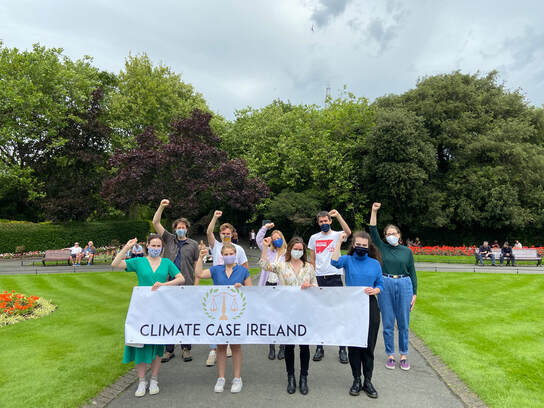
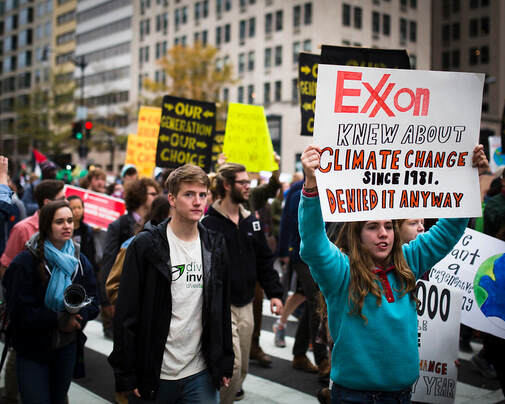
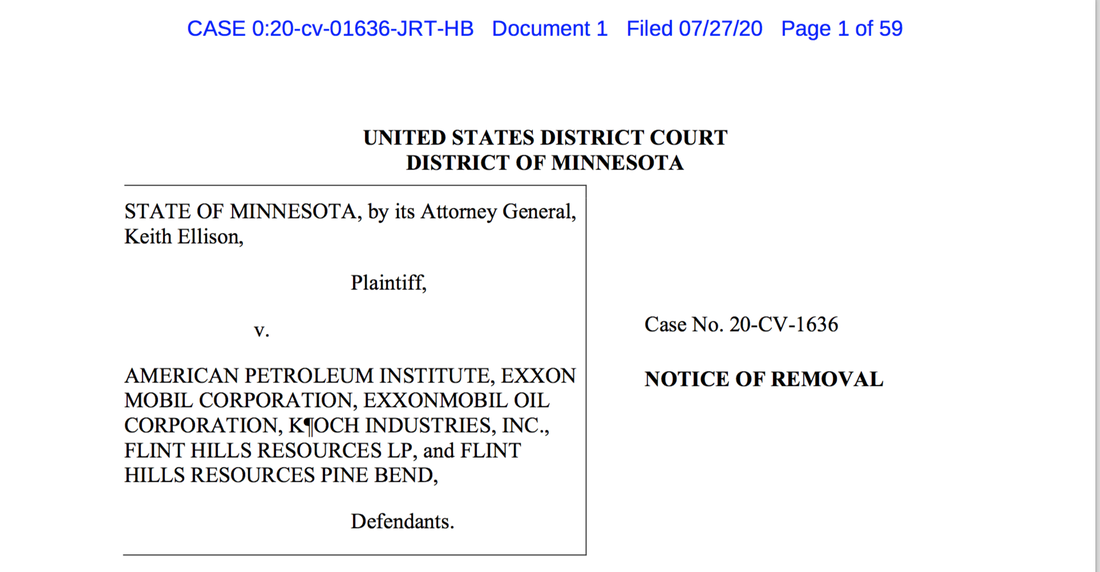


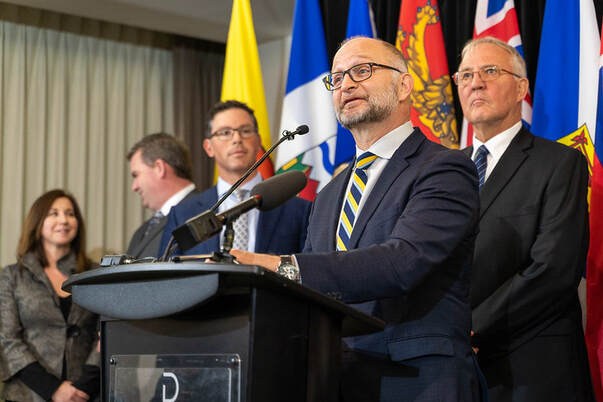
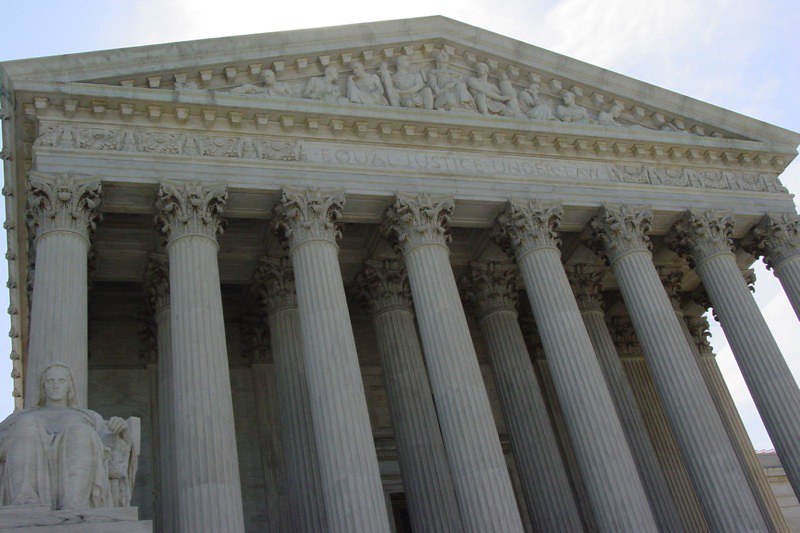


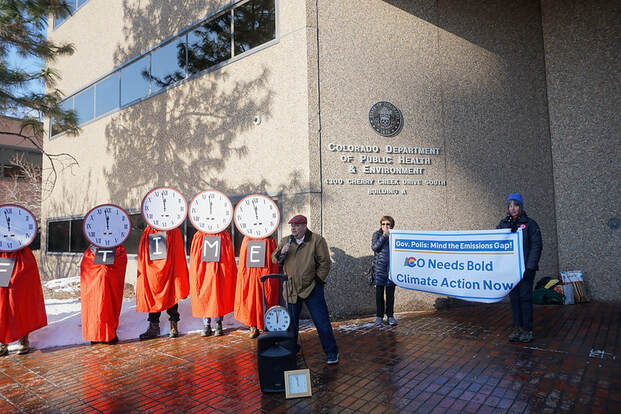

 RSS Feed
RSS Feed